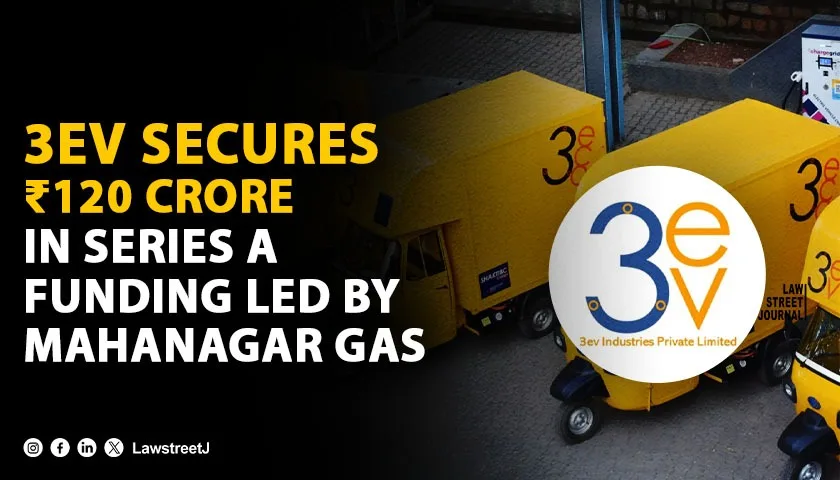New Delhi: Electric vehicle manufacturer 3ev Industries has raised ₹120 crore in its Series A funding round, marking a significant step in the country’s electric mobility expansion. The round was led by Mahanagar Gas Limited (MGL), which invested ₹96 crore—its first major investment in the EV sector. The new capital will be used to expand manufacturing capacity, strengthen charging infrastructure, and enhance aftermarket services in line with national goals under the FAME scheme.
Investment Structure and Regulatory Framework
The Series A round was executed in compliance with the Companies Act, 2013, and SEBI regulations governing private placements. Mahanagar Gas Limited, a listed entity regulated by SEBI, contributed the largest share of ₹96 crore. Other investors included the Thackersey Group (₹10.46 crore), Equentis Angel Fund (₹8.15 crore), and a group of high-net-worth individuals, ultra-HNIs, and family offices (₹4.82 crore).
The investment agreement includes provisions on equity dilution, board representation, and strategic oversight. According to Managing Director Peter Voelkner, the funds will support the launch of 3ev’s new 3C division—Charging, Care, and Conversions—which will deliver integrated electric vehicle services across urban and peri-urban regions.
Legal experts noted that MGL’s entry into electric mobility is permitted under its amended Memorandum of Association, which added EV-related activities as a business vertical earlier this year. The investment was also reviewed under the Competition Act, 2002, to ensure compliance with anti-trust norms given MGL’s prominent position in the city gas distribution segment.
3ev Industries, headquartered in Bengaluru, focuses on electric three-wheelers and urban mobility platforms. The company’s sales rose from 438 units in FY24 to a projected figure exceeding 1,000 units in FY25. The Series A funding will help scale up manufacturing, including establishing a new production facility in Tumakuru, Karnataka—part of the state’s EV cluster development initiative.
The company is also advancing several technology initiatives, including regenerative braking systems, solar-assisted cold-chain EV solutions, and modular battery-swapping stations. These developments align with guidelines issued by the Ministry of Heavy Industries on EV component localization and AIS-156 standards on battery safety. The upcoming 3C division will manage post-sale services such as predictive maintenance, converting internal combustion engine (ICE) vehicles to EVs, and developing fast-charging networks. Compliance with regulations issued by the Central Electricity Authority and the Bureau of Energy Efficiency is being ensured through technical partnerships and third-party audits.
Regulatory Context and Sector Outlook
The funding arrives during a period of rapid policy evolution in India’s electric mobility sector. The Ministry of Road Transport and Highways has recently issued draft guidelines on EV retrofitting and battery recycling, both of which align with 3ev’s operational plans. The company has registered with the Automotive Research Association of India (ARAI) for homologation of upcoming vehicle models and is participating in the Production Linked Incentive (PLI) scheme for Advanced Chemistry Cell (ACC) batteries.
MGL’s investment signals a strategic shift within the energy distribution sector, expanding its presence from gas-based mobility into electric mobility. Analysts note that other city gas distribution companies may consider similar investments, subject to approvals from the Petroleum and Natural Gas Regulatory Board (PNGRB).
The move also supports India’s COP26 commitments to reduce carbon emissions and accelerate the transition to sustainable transport. Legal observers indicate that companies expanding manufacturing facilities must navigate various compliance requirements, including environmental clearances, land acquisition laws, and labour regulations.









